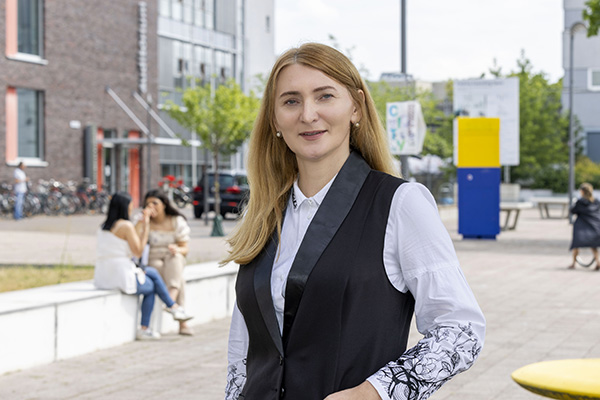Kontakt
Abteilung für
Hochschulkommunikation
Tel +49 335 5534 4515
presse@europa-uni.de
Sitz:
Hauptgebäude
Räume 114-117, 102
Postanschrift:
Große Scharrnstraße 59
15230 Frankfurt (Oder)
Zur deutschen Version des Interviews
As a Professor from Kyiv, how did you come to apply to the ENS Fellowship Program?
Russia's large-scale aggression against Ukraine had an impact on my work, my job, my family and the place I live in. With the expansion of the war in February 2022, my family was forced to leave Ukraine and come to our relatives in Berlin. I was looking for opportunities to continue my scientific activity. First and foremost, I was interested in fellowship programs in the field of digitalization in public space. I was very happy when I found such a program at ENS through a Google search. And I was even more excited when I received this scholarship. Because the topics ENS deals with are very close to my research interests. Also, there are many new and innovative approaches to solve important problems using digital technologies. A very important question is that of ethics in the digital sphere, which is actively discussed at ENS.

Where is your actual scientific home?
I actually live and work in Kyiv. I have a PhD in public administration sciences and I am a professor of public management and administration at the National Aviation University. I am also the head of the board of the NGO Institute of Public Strategies. I am also a trainer for public servants in workshops on digital issues, for example when it comes to cybersecurity. Before coming to ENS, I was a junior fellow at the Alfried Krupp Wissenschaftskolleg Greifswald.
What does the fellowship at ENS mean to you?
It is an opportunity for me to be part of the scientific community despite the war. I can learn new things and advance my research with the goal of helping my country during the war - and supporting reconstruction after the war.
At ENS, I learn about the research, topics, methods, and publications of the best researchers in the field of digitalization and digital transformation - this is extremely useful for me. Having access to innovative and interdisciplinary research approaches and artificial intelligence tools is very helpful.
What exactly is your project at ENS?
My project is about how technologies can enable digital inclusion in Europe. For this, I classify technologies, innovations and approaches that contribute to improving the quality of life of all citizens, including vulnerable and marginalized groups. In a second step, I look at barriers to digital access and how they can be overcome. Finally, I identify areas where the digital literacy of diverse populations, particularly public employees and marginalized groups, can be improved.
What is the practical application of this knowledge against the backdrop of the war in Ukraine?
I am preparing recommendations for the Ukrainian authorities on how digital technologies can improve the quality of life of various population groups. In doing so, I also consider the consequences of Russian aggression, which has significantly affected people's standard of living. To give just one example: There will be many people with war-related disabilities or trauma after the war who can get help by digitalization in the workplace. In addition, it is very important for Ukraine's desire to become part of the EU to meet EU standards, especially in the area of digitalization and data protection. The war has severely affected the digital sector, yet it remains one of the most resilient in Ukraine and has significant potential for recovery.
Interview: Frauke Adesiyan
Photo: Heide Fest
Abteilung für
Hochschulkommunikation
Tel +49 335 5534 4515
presse@europa-uni.de
Sitz:
Hauptgebäude
Räume 114-117, 102
Postanschrift:
Große Scharrnstraße 59
15230 Frankfurt (Oder)